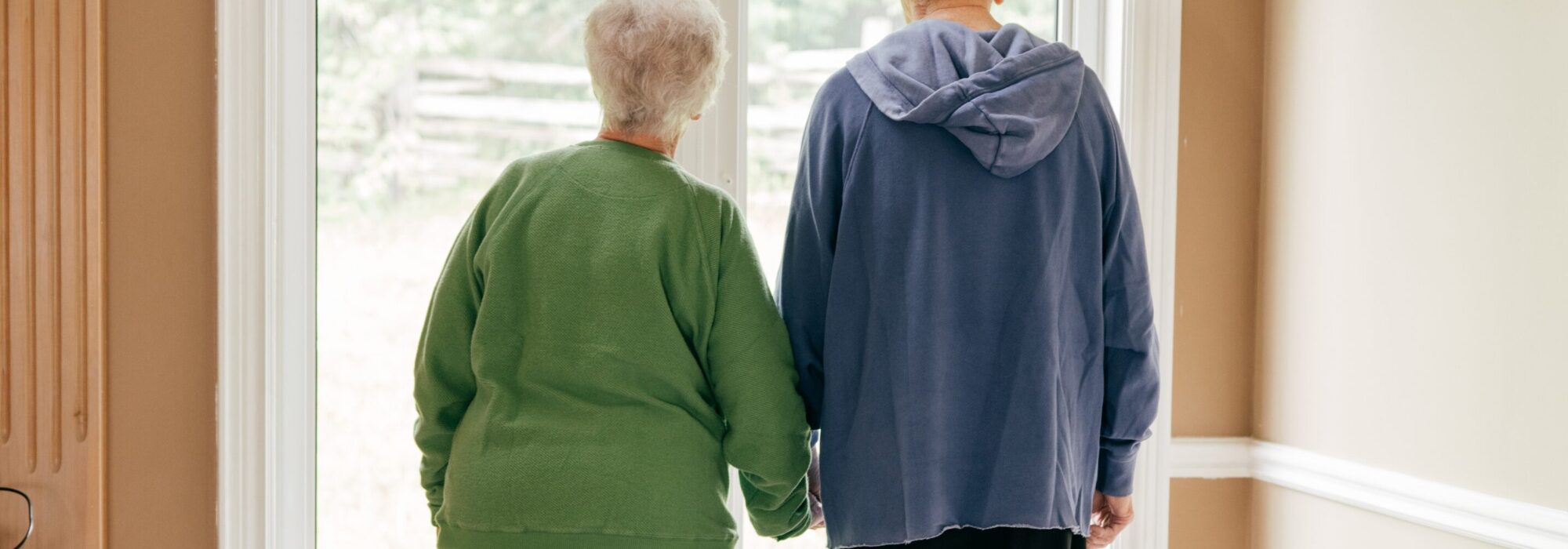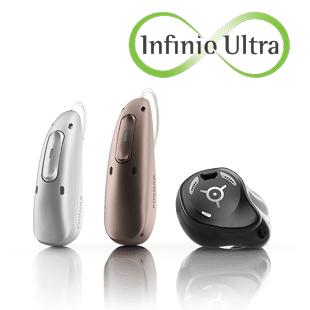
Exploring the link between hearing intervention and fall risk in older adults
A secondary analysis from the ACHIEVE study suggests that best practice hearing interventions may help reduce the rate of falls in older adults, offering promising implications for long-term health and mobility.
In a 2020 study, it was found that over a quarter of community-dwelling older adults experienced a fall in the preceding year, and one in ten of these falls resulted in an injury. 1
Falls are the leading cause of non-fatal injuries2 and mortality rates from falls among older adults (aged ≥75 years) have more than doubled in the past two decades.3 Hearing loss, which is highly prevalent among older adults, has been associated with an increased likelihood of falling4-5.
Several potential mechanisms could explain the link between falling and hearing loss. These include:
- Shared underlying causes affecting both cochlear and vestibular function.
- Limited auditory input hindering access to essential cues for spatial awareness.
- Greater listening effort required which decreases the availability of cognitive resources for other tasks such as maintaining postural control and navigating through space.
- Hearing loss potentially contributing to other adverse outcomes like frailty, which may increase the risk of falls.
Key finding at a glance
In the ACHIEVE Study, older adults who received hearing interventions experienced a 27% reduction in the average number of falls over three years compared to those in a health education control group.
Study design and falls assessment
The Aging and Cognitive Health Evaluation in Elders (ACHIEVE; clinicaltrials.gov NCT03243422) study was a three year, unmasked, randomized controlled trial of adults ages 70-84 years across four sites in the United States.6,7
It included 977 participants with untreated, bilateral mild-to-moderate hearing loss.
Participants were randomly assigned to one of two groups:
- A health education control group, or
- A hearing intervention group.
They were followed for a period of three years.
The main question in the ACHIEVE Study was whether a hearing intervention or a health education control intervention would impact cognitive decline, as measured by a comprehensive cognitive evaluation. As reviewed elsewhere, a reduction in cognitive decline was seen in participants with more risk factors for cognitive decline.
In addition to the primary results, the ACHIEVE Study allows us to evaluate the effects of hearing intervention on other health outcomes8-10 including falls11.
How falls were assessed
Each year following the start of the study, participants were asked about their experiences with falls. The goal was to better understand both the frequency and the seriousness of these incidents. Questions included:
- “Have you fallen in the past year?”
- “If yes, how many times did you fall?”
For the fall that participants thought was the most serious, participants were also asked:
- “Did you need to limit your activities because of an injury from this fall?”
- “Did this fall result in an injury that required a visit to your doctor?”
If participants answered “yes” to either of these follow-up questions, the fall was classified as injurious. These types of fall history questions have been utilized in previous studies1.
What we learned
Over the three-year period, participants in the hearing intervention group experienced fewer falls than those in the health education control group. On average:
- Hearing intervention group: 1.45 falls
- Health education control group: 1.98 falls
This corresponds to a 27% reduction in the mean number of falls over three years for those who received the hearing intervention versus control. The benefit was seen for both recruitment sources and for male and female participants.
A similar trend was observed with injurious falls (those that led to limited activity or required medical attention), although there were fewer on average.
Upon closer examination of these findings and considering whether participants were following their treatment (using the hearing intervention or adhering to the health education control intervention), we found a consistent effect. This effect was especially strong in the first year after baseline, diminishing in years 2 and 3. This pattern remained, even when accounting for hearing aid usage.
Why do these results matter? What are the limitations?
Some previous studies have shown a connection between using hearing aids and a decrease in falls, while others have reported no impact or even a reverse effect.11
Our study is unique as, to our knowledge, we are the first to compare groups randomized to the intervention, in contrast to previous studies that compared existing hearing aid users with non-users.11
That said, a few limitations are important to acknowledge:
- The study was not specifically designed to evaluate falls as a primary outcome.
- Falls were self-reported, which may be subject to incomplete recall.
- The study spanned 2017–2022, a period influenced by the COVID-19 pandemic which was marked by significant changes in daily routines and activities.
Because of these factors, the findings should be considered hypothesis-generating instead of hypothesis testing, meaning they point to a potential benefit that needs to be confirmed in future studies and with different populations.
What’s the takeaway?
Addressing falls in older adults is crucial for public health and emphasizes the importance of ensuring that our patients and community members have access to appropriate support to minimize the risk of falling.
Based on these findings, comprehensive hearing care including hearing aids, educational counseling, and self-management support are associated with benefits in reducing the rate of falls, without any identified risks linked to wearing them.
When communicating these findings to patients and their families, it’s important to exercise caution and be clear:
- While this study shows a positive effect of wearing hearing aids in reducing falls, it is not a direct treatment for balance or fall prevention currently.
- Individuals at risk of falling should have their needs assessed comprehensively.
Regardless, addressing untreated hearing loss in older adults is recommended, as it improves communication and may have broader positive effects on various aspects of daily life. While further research is needed to confirm these results on falls, they do suggest that hearing interventions could potentially reduce falls, offering promising implications for future care standards for older adults.
Learn more
We invite you to read the full study, published in The Lancet Public Health, to better understand the impact of hearing interventions on fall risk in older adults: Link
You can also find this article and other evidence supporting hearing intervention in the Phonak Evidence Library.
Source of Funding:
The Aging and Cognitive Health Evaluation in Elders (ACHIEVE) Study is supported by the National Institute on Aging (NIA) grant R01AG055426, with magnetic brain resonance examination funded by NIA R01AG060502 and with previous pilot study support NIAR34AG046548 and the Eleanor Schwartz Charitable Foundation, in collaboration with the Atherosclerosis Risk in Communities (ARIC) Study, supported by National Heart, Lung and Blood Institute contracts (HHSN268201100005C, HHSN268201100006C, HHSN268201100007C,HHSN268201100008C, HHSN268201100009C, HHSN268201100010C,HHSN268201100011C, and HHSN268201100012C). Neurocognitive data in ARIC is collected by U01 2U01HL096812, 2U01HL096814, 2U01HL096899, 2U01HL096902, 2U01HL096917 from the NIH (NHLBI, NINDS, NIA and NIDCD), and with previous brain MRI examinations funded by R01HL70825 from the NHLBI. Hearing aids, hearing assistive technologies, and related materials used in the ACHIEVE Study were provided at no cost to the researchers or the participants from Sonova/Phonak LLC. The funders of the study, nor the sponsoring manufacturer, had no role in study design, data collection, data analysis, data interpretation, or writing of the report.
Acknowledgments: Members of the ACHIEVE Collaborative Research Group are listed at https://www.achievestudy.org/about/our-team. The authors thank the staff and participants of the ACHIEVE and ARIC studies for their important contributions.
References:
- Moreland, B., Kakara, R., & Henry, A. (2020). Trends in Nonfatal Falls and Fall-Related Injuries Among Adults Aged ≥65 Years – United States, 2012-2018. MMWR. Morbidity and mortality weekly report, 69(27), 875–881. https://doi.org/10.15585/mmwr.mm6927a5.
- WISQARS Leading Causes of Nonfatal Injury Visualization Tool. (n.d.). Centers for Disease Control and Prevention. Retrieved June 30, 2025, from https://wisqars.cdc.gov/lcnf/
- Hartholt, K. A., Lee, R., Burns, E. R., & van Beeck, E. F. (2019). Mortality From Falls Among US Adults Aged 75 Years or Older, 2000-2016. JAMA, 321(21), 2131–2133. https://doi.org/10.1001/jama.2019.4185
- Jiam, N. T., Li, C., & Agrawal, Y. (2016). Hearing loss and falls: A systematic review and meta-analysis. The Laryngoscope, 126(11), 2587–2596. https://doi.org/10.1002/lary.25927
- Yeo, B. S. Y., Tan, V. Y. J., Ng, J. H., Tang, J. Z., Sim, B. L. H., Tay, Y. L., Chowdhury, A. R., David, A. P., Jiam, N. T., Kozin, E. D., & Rauch, S. D. (2025). Hearing Loss and Falls: A Systematic Review and Meta-Analysis. JAMA otolaryngology– head & neck surgery, 151(5), 485–494. https://doi.org/10.1001/jamaoto.2025.0056
- Lin, F. R., Pike, J. R., Albert, M. S., Arnold, M., Burgard, S., Chisolm, T., Couper, D., Deal, J. A., Goman, A. M., Glynn, N. W., Gmelin, T., Gravens-Mueller, L., Hayden, K. M., Huang, A. R., Knopman, D., Mitchell, C. M., Mosley, T., Pankow, J. S., Reed, N. S., Sanchez, V., … ACHIEVE Collaborative Research Group (2023). Hearing intervention versus health education control to reduce cognitive decline in older adults with hearing loss in the USA (ACHIEVE): a multicentre, randomised controlled trial. Lancet (London, England), 402(10404), 786–797. https://doi.org/10.1016/S0140-6736(23)01406-X
- Deal, J. A., Goman, A. M., Albert, M. S., Arnold, M. L., Burgard, S., Chisolm, T., Couper, D., Glynn, N. W., Gmelin, T., Hayden, K. M., Mosley, T., Pankow, J. S., Reed, N., Sanchez, V. A., Richey Sharrett, A., Thomas, S. D., Coresh, J., & Lin, F. R. (2018). Hearing treatment for reducing cognitive decline: Design and methods of the Aging and Cognitive Health Evaluation in Elders randomized controlled trial. Alzheimer’s & dementia (New York, N. Y.), 4, 499–507. https://doi.org/10.1016/j.trci.2018.08.007
- Bessen, S. Y., Zhang, W., Huang, A. R., Arnold, M., Burgard, S., Chisolm, T. H., Couper, D., Deal, J. A., Faucette, S. P., Goman, A. M., Glynn, N. W., Gmelin, T., Gravens-Mueller, L., Hayden, K. M., Mitchell, C. M., Pankow, J. S., Pike, J. R., Reed, N. S., Sanchez, V. A., … ACHIEVE Collaborative Research Group. (2024). Effect of Hearing Intervention Versus Health Education Control on Fatigue: A Secondary Analysis of the ACHIEVE Study. The Journals of Gerontology. Series A, Biological Sciences and Medical Sciences, 79(11), glae193. https://doi.org/10.1093/gerona/glae193
- Huang, A. R., Morales, E. G., Arnold, M. L., Burgard, S., Couper, D., Deal, J. A., Glynn, N. W., Gmelin, T., Goman, A. M., Gravens-Mueller, L., Hayden, K. M., Mitchell, C. M., Pankow, J. S., Pike, J. R., Reed, N. S., Sanchez, V. A., Schrack, J. A., Sullivan, K. J., Coresh, J., Lin, F. R., … ACHIEVE Collaborative Research Group (2024). A Hearing Intervention and Health-Related Quality of Life in Older Adults: A Secondary Analysis of the ACHIEVE Randomized Clinical Trial. JAMA network open, 7(11), e2446591. https://doi.org/10.1001/jamanetworkopen.2024.46591
- Sanchez, V. A., Arnold, M. L., Garcia Morales, E. E., Reed, N. S., Faucette, S., Burgard, S., Calloway, H. N., Coresh, J., Deal, J. A., Goman, A. M., Gravens-Mueller, L., Hayden, K. M., Huang, A. R., Mitchell, C. M., Mosley, T. H., Jr, Pankow, J. S., Pike, J. R., Schrack, J. A., Sherry, L., Weycker, J. M., … ACHIEVE Collaborative Study (2024). Effect of hearing intervention on communicative function: A secondary analysis of the ACHIEVE randomized controlled trial. Journal of the American Geriatrics Society, 72(12), 3784–3799. https://doi.org/10.1111/jgs.19185
- Goman, A. M., Tan, N., Pike, J. R., Bessen, S. Y., Chen, Z. S., Huang, A. R., Arnold, M. L., Burgard, S., Chisolm, T. H., Couper, D., Deal, J. A., Glynn, N. W., Gmelin, T., Gravens-Mueller, L., Hayden, K. M., Martinez-Amezcua, P., Mitchell, C. M., Pankow, J. S., Reed, N. S., Sanchez, V. A., … ACHIEVE Collaborative Research Group (2025). Effects of hearing intervention on falls in older adults: findings from a secondary analysis of the ACHIEVE randomised controlled trial. The Lancet. Public health, 10(6), e492–e502. https://doi.org/10.1016/S2468-2667(25)00088-X
Author information:
Jacqueline Weycker, AuD
Dr. Weycker is a research audiologist at the University of Minnesota in the School of Public Health. She is the lead study audiologist at the Minneapolis field site for the ACHIEVE study.

Adele Goman, PhD
Dr. Goman is a Lecturer in Health Technology Assessment and Innovation in the School of Health and Social Care at Edinburgh Napier University and Associate faculty of the Johns Hopkins Cochlear Center for Hearing and Public Health. Her research interests include the individual and societal impact of hearing loss and hearing loss interventions on health and wellbeing; addressing barriers and inequities in hearing care and hearing technology utilisation; and considerations of sensory loss in clinical practice.
LinkedIn: https://www.linkedin.com/in/adele-goman-b0662999/

Victoria Sanchez, AuD, PhD
Dr. Sanchez is a clinician scientist at the University of South Florida where she provides patient care, teaches and mentors trainees, and conducts research in the Auditory Rehabilitation & Clinical Trials Laboratory.
LinkedIn: www.linkedin.com/in/victoria-sanchez-aud-phd-60009119a

Theresa Chisolm, PhD
Dr. Theresa (Terry) Chisolm is a Professor of Audiology in the Department of Communication Sciences and Disorders at the University of South Florida (USF) where she began in 1988 as an Assistant Professor. Dr. Chisolm specializes in rehabilitative audiology and is a licensed and certified audiologist, with over 40 years of clinical and research experience. Previous research examined the efficacy of a computer-based auditory training program for use post-hearing aid fitting, the benefits of group aural rehabilitation, approaches to auditory rehabilitation for veterans with mild traumatic brain injury, and systematic reviews of hearing-related quality of life outcomes from hearing aid use. Her current role as a co-investigator on the Aging and Cognitive Health Evaluation in Elders (ACHIEVE) Randomized Study has spanned from initial conceptualization to development of the manualized best-practices hearing intervention to implementation and fidelity monitoring with her co-PI colleagues at USF’s Audiology Rehabilitation Clinical Trial’s laboratory (ARCT), Drs. Victoria Sanchez and Michelle Arnold. Dr. Chisolm has worked closely with the ACHIEVE audiologists with whom she, along with the ACHIEVE team, are continuing their work on data analysis, interpretation and dissemination of the original trial data. In addition, Dr. Chisolm is actively participating in several follow-up studies examining the long-term effects of hearing intervention on brain health in the ACHIEVE trial and a trial comparing telehealth vs. conventional hearing care delivery in the ACHIEVE study.
LinkedIn: https://www.linkedin.com/in/theresa-chisolm-4234366b/

